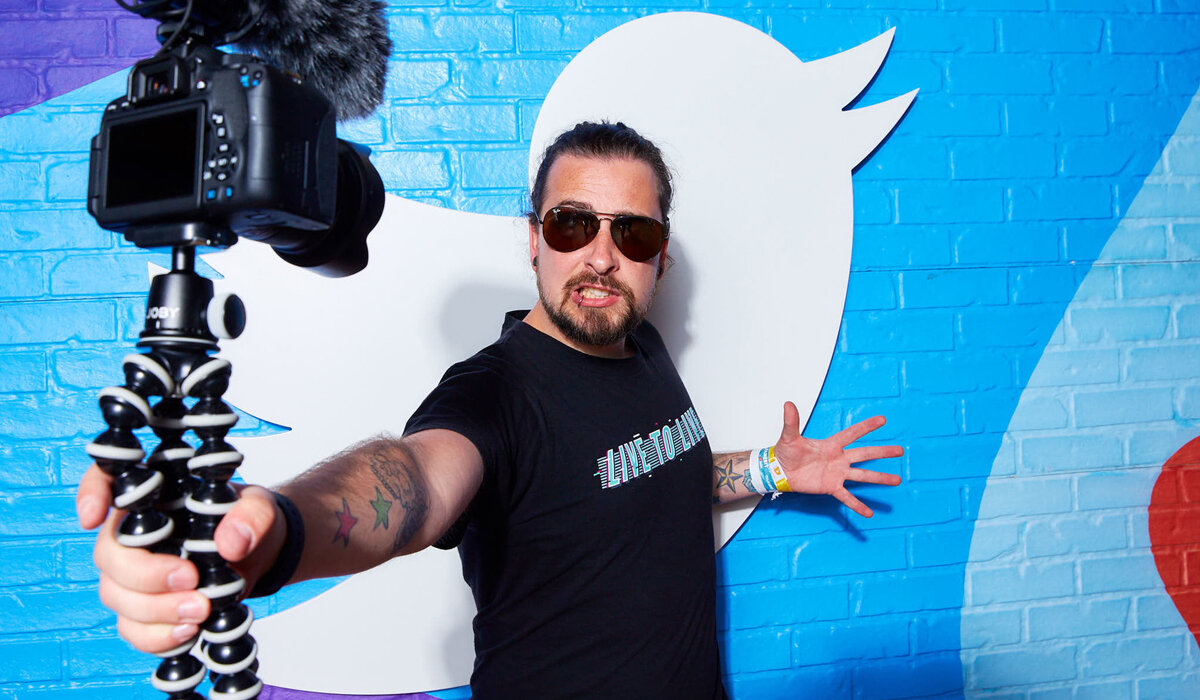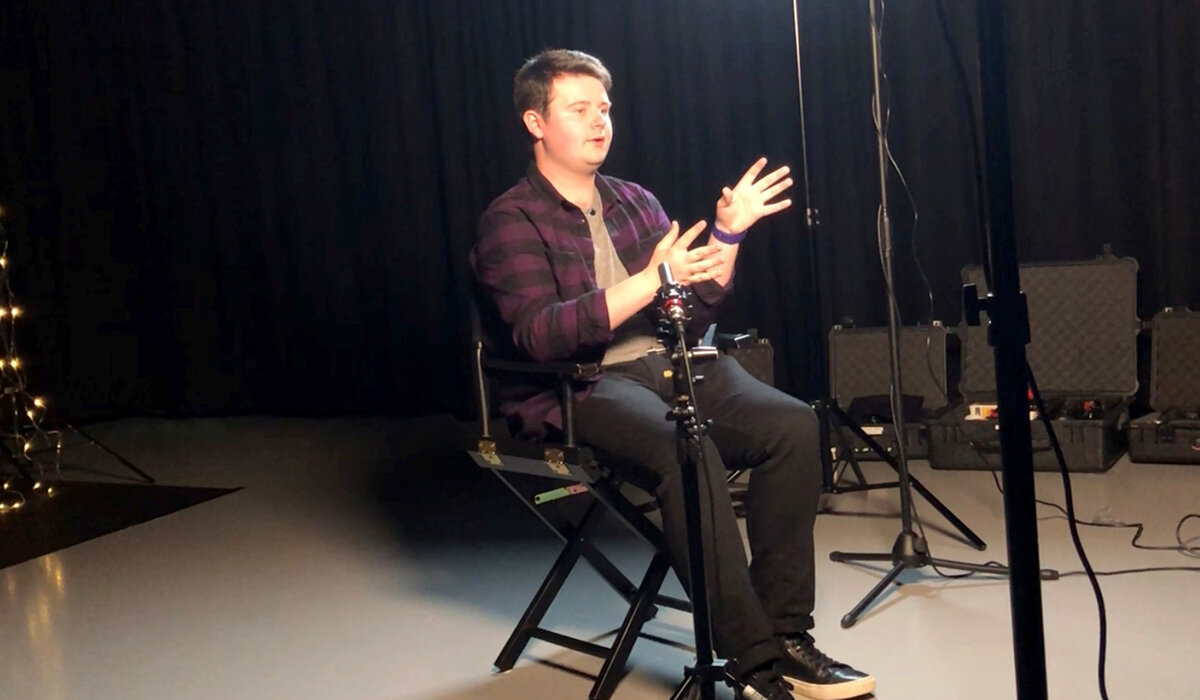
"Online gaming means autistic people can play in an environment we feel comfortable in and can control."
Barrington Campbell
- on his love of online gaming
Stories from the Spectrum: Barrington Campbell
Meet Barrington, an autistic person who put his gaming skills to great use by raising money for the National Autistic Society, to help create a world that works for autistic people.
Barrington tells us about hosting an online game stream-a-thon, how online gaming can help reduce social isolation for autistic people and adapting his fundraiser during the coronavirus (COVID-19) outbreak. He also shares his tips for running a successful fundraising event…
Tell us about your fundraiser…
My fundraiser was all about interacting with people and building a community. I hosted a stream-a-thon for the National Autistic Society. I was meant to go to my friends’ houses and stream playing games with them, but this ended because of the coronavirus (COVID-19) outbreak, so we played lots of games online instead. I have a Twitch channel, a live video streaming platform (really popular with gamers), and I streamed playing games for a week, Monday to Sunday, twice a day, for six hours at a time. I usually played multiplayer games, such as online tabletop or board game simulators, so the community could play together. I played Legend of Zelda: Breath of the Wild solo in the evenings. We also held a Sea of Thieves Obsidian six item pack give-away, which was immensely popular. On one day, 78 people were watching the stream at any given time, and over the course of a week about 500 people joined the stream collectively. We raised £655.
Why is raising funds through playing online games a great way to support autistic people?
For me, raising funds online provides a safe haven, where I don’t have to worry about interacting with people face to face. If you are autistic, this can feel more than stressful. Online gaming means autistic people can play in an environment we feel comfortable in and can control — if it’s not going well on screen, we can get into our safe spaces.
"Online gaming means autistic people can play in an environment we feel comfortable in and can control."

Tell us how you started designing boardgames…
I was diagnosed as autistic when I was 30 years old. It put my life into perspective. As a child, I felt different to my peers, was out of school for a year and had ‘extreme’ emotions. I felt either extremely happy or extremely sad. I knew I needed help, and a therapist suggested I might be autistic. At the time, I had no idea about autism, so I began researching it. Finally, there was an answer for why I still felt different, even as an adult. My counsellor suggested, as I said I process social situations and emotions very logically, like a game, that I try writing one myself. The next week, I came back having written three tabletop games about understanding emotions. Now, I’m able to recognise emotions in other people because I’m more in touch with my own emotions and reactions. I have also created my own company, Kagai Games. I create tabletop games and video content aimed at people on the spectrum and people who have depression and anxiety to help them interact and form a community.
How can online gaming reduce social isolation for autistic people?
For me, the hardest thing about socialising is gauging what other people are thinking or how they are feeling. I think this is also what triggers anxiety in lots of autistic people when socialising face to face. I spend so much time masking (a term used by some autistic people that means hiding how they are really feeling) and mirroring that I sometimes get stressed out. I wonder who I am, because I spend so long pretending to be someone else, someone not on the spectrum who has no trouble socialising.
Either online or tabletop gaming gives me something to focus on that isn’t the other person in the room — I’m so busy thinking about strategy, I relax as gaming gives me a set of rules and guidelines to interact. I also think gaming can be used to help people learn new things or practise their skills, for example the hand-eye coordination skills required to throw an item from one side of the screen to the other. Games can have a bad reputation for being ‘time-wasting’ or ‘geeky,’ but I think this is a very surface level opinion. Games like Stellaris, which is a multi-player game about building an empire in space, is really just simulating an economy and having you balance it. It can help people understand how an economy may work and stimulate an interest, where they might not have been one previously.
What would you say to an autistic person who wants to play online games, but might not know where to start or be nervous to get involved?
I’d suggest reading forums, because you don't have to interact with other people to see what they have to say — but take everything you read with a pinch of salt and decide your own opinions, too. Get comfortable with a game before playing with other people, as you will know what to expect before playing online, but don’t be afraid to ask questions! The more you let people know you’re new to something and want to find out more, the easier it will be to interact and people will want to share their knowledge.
If you ever feel like you’re having difficulties interacting online, check out online streaming platforms, as by ‘lurking’ (watching people play games without joining in) on a channel, you can pick up tips and watch people take part without worrying about how you are going to play the game yourself. If you have friends who have a game you want to play, you could tell them you want to play with them, but are feeling nervous about it. This isn’t just a guide for gaming, it’s a guide for life — approach things with openness and honesty and if people don’t like you because of something you have already told them about, you don’t need to worry.
What are your tips for running a successful fundraiser and how can people start their own?
Start early. Find people who have run a fundraiser before and ask their advice. Research your cause, find something you’re comfortable doing and most importantly do it for the fun of it. As long as you are doing something you enjoy, you can raise awareness as people will come and enjoy it with you — if people donate money at the same time, even better.
Why are you raising funds for the National Autistic Society?
If there is a library of knowledge about autism you want to get your hands on, such as information and advice, you're looking for the best place to talk to someone, you want to join a group, or find out about events, you go to the National Autistic Society. Their website is the first place I go if I have any questions or queries.
Have you ever received support from the National Autistic Society?
My support has come through the fundraising team, who have been so friendly and are always there when I have questions.
How can online games support autistic people and their families during the coronavirus (COVID-19) outbreak?
I carried on with my fundraiser after the lockdown because I wanted to provide some relief from anxiety for people who are stuck indoors and have no outlet for fun. Every autistic person is different and autistic people don’t always want to be at home. Having somewhere to escape where they feel understood could be the only relief someone has in this period of being ‘locked in’. Right now, online gaming and forums are some of the only places where people get a feeling of community support and they have to keep running, otherwise we will see a huge decline in mental health and well-being.
What’s next for you?
I am continuing to stream on Tuesdays, Thursdays and Sundays. The first letter of the days I’m streaming on are an in-joke standing for ‘Tabletop Simulator’, which is a type of game I stream quite often. I also want to build a community around tabletop games, which my company Kagai Games makes to support autistic people or people with anxiety and depression. 25% of all profits, after expenses, go to the National Autistic Society.
We're so grateful to Barrington for his ongoing support, particularly during these times.
Watch Barrington on Spectrum Live
Don't miss our next episode of Spectrum Live on 22 October. As part of our ongoing 'Life stories series', we'll be chatting to Barrington about his autism diagnosis, getting into gaming, and more...
Similar stories

"Video conventions should be autism-friendly because there is a thriving community that want to go to these events."
Dan Jones
- on going to video conventions as an autistic person
Read more

"A fear I have is that I'll be judged for over-reacting. It makes it scary to ask for help."
Connor Ward
- on coping with unexpected changes
Read more

"We wanted to celebrate how social media has helped so many people in the autistic community."
Connor Ward
- on being part of the first autism-themed panel at Comic Con
Read more

The Spectrum magazine
Explore one of the UK's largest collections of autistic art, poetry, and prose. The Spectrum magazine is created by and for autistic people, and is available both online and in print.

Streaming
Put your gaming and streaming skills in to play for Team Autism! Our free step-by-step guide will help you host an epic online fundraiser.






You are not alone
Join the community
Our online community is a place for autistic people and their families to meet like-minded people and share their experiences.
Join today